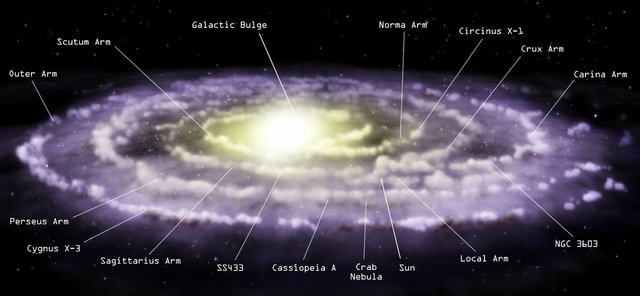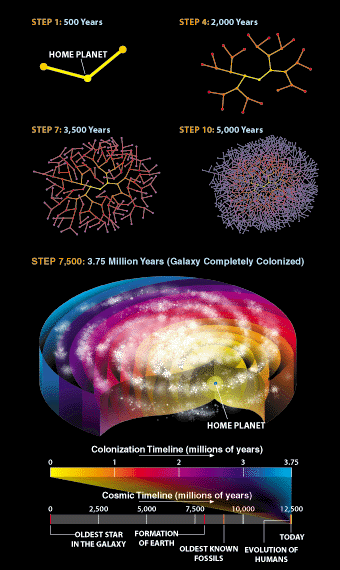Explaining the Fermi Paradox - Why the Universe is teeming with life but we may never make contact.
Summer of 1950, Los Alamos - Enrico Fermi, Emil Konopinski, Edward Teller, and Herbert York were walking to lunch at Fuller Lodge. Four great minds commence doing what they do best. Bantering about a cartoon they had seen recently, of course. It was about a flying saucer steaming towards little green men (endowed with antennas) carrying the trash cans.
Fermi contemplated how it could a reasonable inference, supported by the sudden reports of flying saucers and disappearances of trash cans at the time. Could saucers travel faster than light?
The four scientists concluded that saucers are fictional, but not before seriously debating the merits of it. With the debate concluded, they picked up lunch, and sat together - a group of about eight.
The flying saucers gave way to usual small talk around meals. Out of the blue, Fermi asked, "But where is everybody?". The entire group burst out laughing. Not just because of the abruptness of the question - but everyone knew he was talking about extraterrestrials!
Thus, the legend of the Fermi Paradox was born. Fermi believed in the existence of extraterrestrials - yet he questioned why we have never met any.

Image: American Institute of Physics
The Fermi Paradox
This is the line of thought examined by Michael Hart.
- The Sun is a young star.
- There are billions of stars in the galaxy that are billions of years
- Some of these stars likely have Earth-like planets which if the Earth is typical may develop intelligent life.
- Presumably some of these civilizations will develop interstellar travel a technology Earth is investigating even now.
- At any practical pace of interstellar travel the galaxy can be completely colonized in a few tens of millions of years.
- According to this line of thinking the Earth should have already been colonized or at least visited
But no convincing evidence of this exists. - Furthermore no confirmed signs of intelligence elsewhere have been spotted either in our galaxy or the more than 80 billion other galaxies of the observable universe.
Hence,
The apparent size and age of the universe suggest that many technologically advanced extraterrestrial civilizations ought to exist. However, this hypothesis seems inconsistent with the lack of observational evidence to support it.
There are many possible explanations for the Fermi Paradox. I'll take you through one such line of thought - but hardly the only one.
The most obvious answer would be - extraterrestrials simply don't exist. We are alone. But let's see why that's highly unlikely.
Abiogenesis
Simply put, abiogenesis is the process by which elements of life form from non-living molecules. At first, the probability of forming a long protein seems to be an extra-astronomical 1 chance in 10400. That's way more than atoms in the Universe!
However, looking closer, abiogenesis is not just random chance. It's a process, where every step is curated by trial and error. Early natural selection, so to speak. Life doesn't just emerge from simple chemicals. From simple chemicals come polymers, followed by replicating polymers, before anything that remotely resembles life.
Given the volume of water in early Earth's oceans, even with a dilute concentration of amino acid, there are trillions of trials taking place. It all adds up - an enormous number of 1031 replicating peptides are likely to evolve within a year.
It's no co-incidence, then, that Life began almost immediately after the Late Heavy Bombardment, once oceans started to emerge.
Pretty much as soon as life is possible, it takes hold.
Life is extraordinarily resilient
Life doesn't even need water, sunlight, or Oxygen! Indeed, there are extremophiles of all kinds, who thrive in conditions that will quickly kill most organisms. Whether it be highly acidic, extremely hot, complete absence of Oxygen - species have evolved to survive everywhere.
But how about the ultimate test - Space itself. Not only do some organisms survive, but they even thrive! Often causing the ISS crew great problems. Though not technically extremophiles, Tardigrades are true superheroes. These tiny animals can survive at absolute zero, vacuum, intense pressures, ionizing radiation - pretty much anything you throw at it.

Image source
So the question is - why ever would an organism from Earth evolve to survive in Space? Surely, there's nothing resembling vacuum on planet Earth. Could they have traveled through Space, to Earth? This idea is called Panspermia, and while unlikely, is certainly impossible. We have pretty surely carried microorganisms to other parts of the Solar System ourselves.
There's little question about it - the Universe is teeming with life. But what about intelligent species capable of interstellar communication?
So the question is - why ever would an organism from Earth evolve to survive in Space?
Life is easy, intelligence is hard
Firstly, we must define intelligence in this context. It is the ability to transmit electromagnetic waves that may be detected by extraterrestrial civilizations as clearly patterned and distinguishable from background noise.
Life on Earth took 4 billion years to achieve that standard, and it took an incredible amount of chance. Given enough time, intelligence will evolve, but the question is - would life survive that long? The Earth has gone through many extinction events - The Great Dying killing off over 90% of all species - and there could be one so cataclysmic that no life survives. Indeed, as I discussed in a previous article, the human species were on the brink of extinction just 75,000 years ago. Had that happened, intelligence could have been postponed by millions of years.
Given intelligence takes time to evolve, just how many intelligent civilizations are there?
The Drake Equation
At an early SETI meeting, Dr. Frank Drake came up with a brilliant equation, to determine the likelihood of intelligent civilizations. This is not a formula but a probabilistic argument, one that should give us an idea of just how probable it is.

N = The number of civilizations in The Milky Way Galaxy whose electromagnetic emissions are detectable.
R* = The rate of formation of stars suitable for the development of intelligent life.
fp = The fraction of those stars with planetary systems.
ne = The number of planets, per solar system, with an environment suitable for life.
fl = The fraction of suitable planets on which life actually appears.
fi = The fraction of life bearing planets on which intelligent life emerges.
fc = The fraction of civilizations that develop a technology that releases detectable signs of their existence into space.
L = The length of time such civilizations release detectable signals into space.
Solving the Drake Equation for the Milky Way galaxy, the original estimates concluded that there are probably between 1,000 and 100 million civilizations.
Today, we have much more information to speculate about most of the parameters.
The equation becomes, N = 7 x 1 x 0.2 x 0.13 x 1 x 0.2 x L.
Or, 0.0364L.
The great unknown is L - how long civilizations last. Using the most pessimistic estimate of L = 420 years, this gets us to 10-15 civilizations. However, we could consider the entire human species as a whole, and bump L a hundred fold. N is probably in the 1,000 range, then.
Considering that there are at least a 100 billion galaxies in the universe, it's fair to say that there are trillions of advanced civilizations across the observable universe.
The Milky Way is vast
Let's start with the Milky Way, a tiny part of the universe. It has a volume of over 12 billion cubic light years. So what if there were 1,000 civilizations? Each one would occupy an "radius of influence" roughly 3,000-5,000 light years across.

Image: Chandra Observatory
Unfortunately, due to the inverse square law, signs of civilization decay to the point of being indistinguishable from background noise within a few light years. Even the most powerful hypothetical electromagnetic signatures by alien civilizations would simply not travel beyond a few hundred light years.
Assuming normal distribution, the probability of two civilizations being within a few light years of each other is over 3 standard deviations, or 1 in thousands / under 0.1%. If we go by the lower figure of 10-15 civilizations within our galaxy, it's practically impossible to run into another intelligent civilization.
The minimum probability of two civilizations being within communication distance is less than 1 in several thousands.
The hypothetical galactic conquerors
The speculation goes like so - An advanced Type II civilization according to Kardashev scale will conquer an entire galaxy within 4 billion years. Of course, there are several problems with this scenario.

Firstly, to get started, building a Type II Dyson sphere - an object that surrounds and harnesses a star's energy - is no easy task. It'll require matter from the entire Solar system, and an amount of energy that can't be generated any other way than an existing Dyson sphere.
In short, if you can build a Dyson sphere - you probably don't need it!
To be realistic, civilizations would have to travel and colonize Space though advanced propulsion methods. 10% the speed of light is entirely possibly, which means a 50,000 year journey to the nearest alien colony. That is, of course, a tall order for a single journey. To travel 50,000 years would mean setting up colonies along the way, each of which could take centuries. Space is a harsh place - it's more than likely many of these colonies will fail and the travelers perish.
However, the hypothetical 50,000 year journey only makes sense once a destination has been found. Of course, this entire exercise is academic, as we won't be communicating with anyone 5,000 light years away anyway!
Finally, there's the possibility that there must be far more advanced civilization, to degrees we cannot comprehend. What we do know is, the more energy a civilization uses, the more at risk it is to run out of resources or go extinct in other ways. This is the Great Filter. Of course, the advantage of space colonization is that the original species would evolve into various different species - evolution on the galactic scale. Nevertheless, one family of species with common ancestry is very unlikely to cast a wide web of influence.
Intergalactic colonization
That is simply not happening, for any civilization. The grandeur of the Universe is inconceivable to us mere humans, but perhaps this incredible video will offer us some perspective.
Across these vast swaths of spacetime, it is pretty much impossible to traverse between galaxies. Looking beyond our Local Group - the nearest galaxies are dozens of millions of light years away. Not to mention, space itself is expanding rapidly, and accelerating.
The obvious exception is when a group of galaxies are in the process of merger - like Milky Way and Andromeda will be in a mere 4 billion years. But at that point it's as good as a single galaxy.
TL;DR
Yes, the Universe is most likely abundant with Life. Intelligent, advanced civilizations, even. It is quite probable that there are over trillion intelligent civilizations across the universe, capable of communication through electromagnetic waves. But the Universe is impossibly massive as well. Very, very rarely would these civilizations ever make contact with one other.
Do check out more great posts on this subject on Steemit by @sauravrungta and @piedpiper.
References:
Calculating the probability of Abiogenesis
Recalling the anecdote
Contemporary discussion on Fermi Paradox
Late Heavy Bombardment co-incides with the beginning of Life
The resiliency of microorganisms in Space
Extremophiles
The Drake Equation
Contemporary update for the Drake Equation
Contemporary numbers for the Drake Equation
Calculations on the span of radio waves
Discussions on Fermi Paradox
Dyson Sphere
And as always, a lot of Wikipedia.
Yes, we're gonna be forever alone.. interesting that you're tallking about abiogenesis (when it comes to life on Earth) and abundance of life in the universe with certainty (We have the same views although I'm not that certain about my stance on this). Well written mate! Enjoyed the chunky texts. Have you read Ringworld by Larry Niven?
Oh, no, I don't mean to be certain! Which is why I put that disclaimer about this being one possible line of thought at the very beginning. This is a blog post, after all. :) But, yes, abiogenesis is likely to be relatively common given the vastness of the universe.
Of course, I love Ringworld! Read a few more of the Known Space series as well. Haven't read them in a decade or so though! Probably a good time to revisit. :)
I love discussions about the Fermi Paradox. If you haven't seen it already, you may also enjoy Wait But Why's post on it. I love that site. So much good stuff.
As far as what is possible... we also can't easily comprehend the result of millions years while also going through exponential technical advancement. The greatest discoveries (What is light, really? What is gravity? Can we create energy enough to curve spacetime ourselves? How will harnessing quantum entanglement influence us as a species?) have yet to be discovered, IMO. If you're into SpaceTime stuff, I highly recommend the YouTube channel appropriately named... SpaceTime. :)
Ah yes, I did read Wait But Why's post - that was brilliant!
Yes, of course, we have no idea what technological advancement would bring is in the near future - let alone the distant future. But there will be a hard limit to how much resources we can consume without destroying ourselves.
If you mean PBS Space Time, yes, of course! I love the channel, had been around since the first few episodes with Gabe. Matt's been awesome - I make sure to watch every episode the day it is published. :)
I should have known you've consumed all of that content, given the clarity and expertise in your writing! :)
omfg!! I loved this post. This is my favourite topic ever. you touched all things that im interested in and all the things i usually look in internet to read about.
Loveeee it, please more posts like these one in the future
Glad you liked it! You can go through my Blog - I have written a fair few posts about Space. I certainly intend to write more, though they may take some time to research.
You should write some posts about this too!
I will
What implications do you think this holds for our own colonization of space?
Given how dramatically our civilization has changed in the last couple of centuries, I have no idea what lies ahead. Certainly, if we are not careful, we could be heading for the Great Filter. But assuming we can overcome the short term effects of environmental damage we have caused before a catastrophe, the idea should be to colonize the Solar System first. We should get moving immediately - it's get to see the likes of Elon Musk and Stephen Hawking heavily push this agenda.
If we can colonize the solar system, the next step would be nearby star systems, of course. I can't even begin to imagine what kind of resources that would take...
It is interesting to note that the applications that will help us survive in space and on hostile (in terms of environment) worlds can also be put to use in our oceans.
But I agree with you, and with Musk and Hawking; one of our higher priorities should be to spread ourselves throughout the solar system, and to prepare for the next step into the galaxy.
One other thing we should be aware of in terms of dangers to our species survival; humans have a tendency to breed beyond our ability to support ourselves. This amplifies the dangers you spoke of.
Really awesome post. I read "Fabric of the cosmos" , Brian Green and explains this concept as well. I cool concept is if we found "life" and we could look at it via telescope ( not possible) that we would be looking into the past. What ever we see is just a light memory of what was there. They have been long gone. Vice versa for anyone "viewing" us from 5,000 light years. Is that correct?
Yes, that's certainly correct. We'll be seeing 5,000 years into the past, and by the time we reach them they will be long gone. An excellent point!
So, I'm not getting a Dyson Sphere for Christmas. Seriously though, great article. I'll sleep better knowing the odds are heavily against the Vorgon destroying Earth tonight. Now where did I put my towel?
If aliens were out there, they almost certainly don't look like Vorgons. :)
Stellar article :) I skimmed it, like the read, am somewhat familiar with the argument. As I observe you don't give a definition of "life" (did I miss it?) I think this is where we might go wrong. Life is an evolution of the physical material in the universe and so I think it could be suggested EVERYTHING is life. That might re-solve the paradox. I might write about this in relation to your article. Cheers.
Please do! I shall look forward to it. I will pass on the definition of Life itself, but I have given a definition of "intelligent life" which is relevant to the Fermi paradox. I.e. the ability to transmit electromagnetic waves that may be detected by extraterrestrial civilizations as clearly patterned and distinguishable from background noise.
These are some of my favourite kind of posts. The great enigma or is it variety. Fantastic work. Thank you.
Great article thanks. Have you read the Expanse books. Some days I feel like steemit is the outer planet alliance.
My personal favorite theory is that we are in a sanctuary and the rest of the galaxy is letting us grow on our own free will. And the UFOs we do "see" are trespassing aliens who are poaching in the sanctuary. They are probably laughing at us right now.
Oh no, I haven't read the Expanse books.
There's this brilliant episode from Rick and Morty where the central character's car battery is run by an entire simulated universe. Pretty much an advanced form of slavery. :)
Very nice post! I really enjoyed reading it, in particular the way you consider various options.
Cheers,
B>
Thanks Benjamin, glad you enjoyed it! I look forward to your explorations of the particle world. :)
My second post was probably too technical, after thinking deeply. I am preparing a funnier one (maybe for tomorrow or after tomorrow...) :)